Encountering Dragonfly: Notes on the Practice of Re-Enchantment
Air Date: Week of October 3, 2025
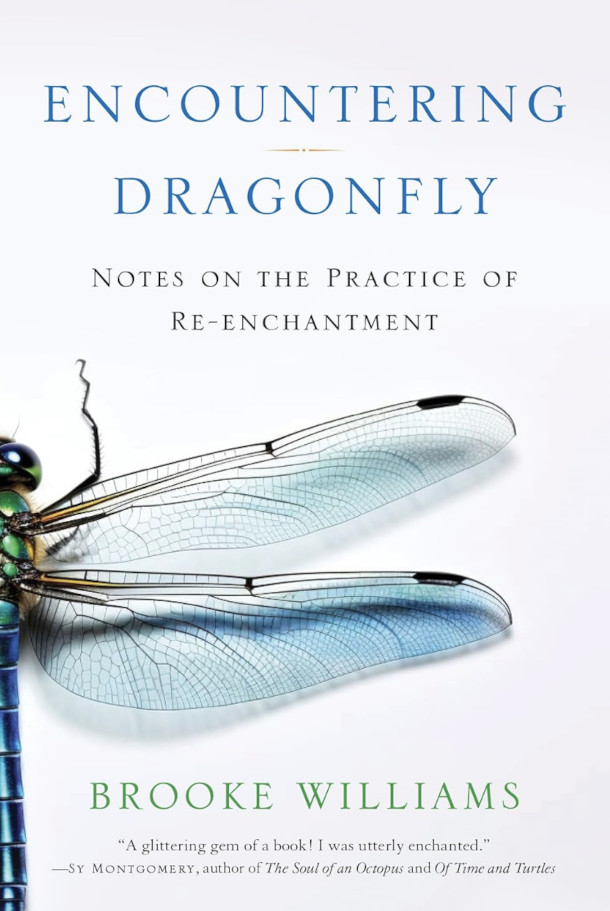
Encountering Dragonfly: Notes on the Practice of Re-enchantment by Brooke Williams. (Cover: Design by Claudine Mansour, Courtesy of Brooke Williams)
In lives full of screens and distraction, it can be hard to truly notice the natural world and the subtle ways that other creatures cross our paths. But author Brooke Williams believes these signs from nature can bring us important insights that are worth paying attention to. He sat down with Host Jenni Doering to chat about how he explores these ideas in his book, Encountering Dragonfly: Notes on the Practice of Re-Enchantment.
Transcript
DOERING: In lives full of screens and distraction, noticing what’s around us can sometimes feel like a rare event. It could be a scarlet leaf drifting from a tree in autumn, the song of a bird at your window, or the scent of rain. But for a moment, we look up, and we pause. Author Brooke Williams believes those flashes of attention are powerful and are imbued with more meaning than we often allow. We sat down at my home in Somerville, Massachusetts to chat about how he explores these ideas in his new book, Encountering Dragonfly: Notes on the Practice of Re-enchantment. Welcome to Living on Earth, Brooke!
WILLIAMS: Thank you for having me, Jenni. I'm really looking forward to this.
DOERING: Thanks so much for being here in person. So your fascination with dragonflies is the catalyst for some of the deeper philosophical explorations in this book. What is it about the dragonfly that has really captivated you and captivated humans for millenia?
WILLIAMS: Well, it goes back to a dream I had like 20 years ago. Prior to that, and ever since, I've always been enamored, obsessed, attracted to the natural world at every dimension. I was a field biologist in college, and any time I get a chance, I'm out looking at things and wondering about just the amazement of natural selection and evolution. And this dream I had had a dragonfly in it, and I realized that it was something that I've seen, I'm sure, dragonflies around, I mean, I was a field biologist, but the unique thing about the dream was, within minutes of waking I started seeing dragonflies everywhere, and I could count on one hand the number of memories I had about a dragonfly prior to the dream, and since then, there have been hundreds. So something happened with the dream, and that's where my obsession started, because I don't know about you, but writing is really hard, and books are really, really hard, and had I not had a couple of questions that I needed to answer, I probably wouldn't have written this book. And the two questions that I think of are, how much more can I learn about these amazing creatures? And the other question was, what happened during that dream that dissolved that border between my dream, unconscious world, and ordinary, everyday reality? So the book is really an exploration of those two questions.
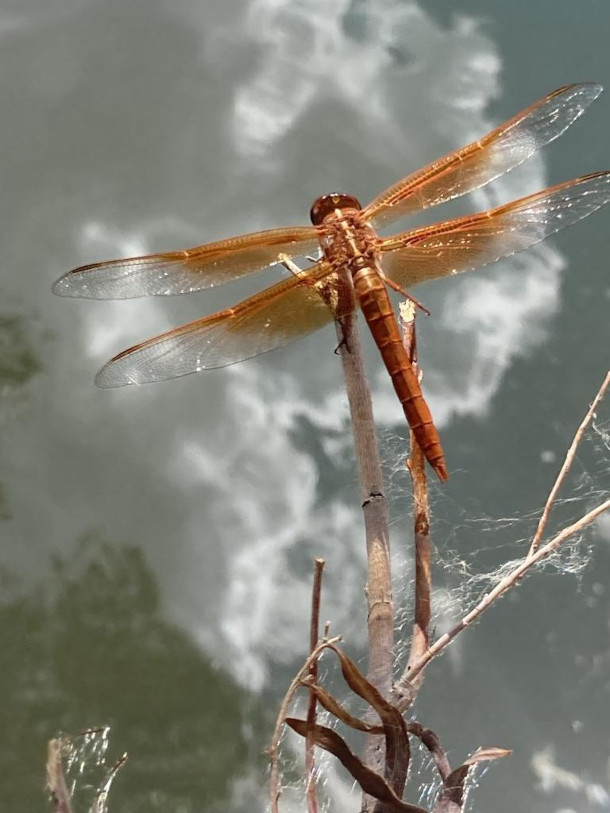
Flame Skimmer. For author Brooke Williams, a dream about a dragonfly catalyzed his fascination with the creatures. (Photo: Brooke Williams)
DOERING: So your subtitle is, "Notes on the Practice of Re-enchantment." To what extent do you think we've become disenchanted as individuals and a society?
WILLIAMS: Yeah, that's something I've been thinking about a lot because going back to trying to understand what happened during that dream, it was years later I was at a lecture at the Harvard Divinity School listening to an academic talk about his book, which was called the myth of disenchantment. And according to most scholars, prior to modernity, the Earth was enchanted, and after modernity, it was disenchanted. Take trees, for instance. We could not cut down entire forests of trees to build forts and temples, whatever, if those trees still had spirits in them. So we just had to assume they didn't. And it's part of the Enlightenment. It's part of this idea that humans know everything, but this idea of an enchanted world where trees have spirits and everything is animated, goes clear back to our earliest beginnings, and we've lived like that for a lot longer than we've lived in a disenchanted world. And I think of it, a lot of it as the commodification of nature. When we started commodifying trees, that meant they couldn't have spirits, we objectified them. In other words, an object is, by definition, something that we manipulate and use for our advantage, as opposed to a subject which we interact with and we learn from. So it's a two-way relationship. I feel like that's a big important element of an enchanted world is living among subjects, as opposed to objects. This is just a massive shift in point of view, which I feel like our lives depend on at this point.
DOERING: Right. You talk in the book about this collective unconscious that you're tapping into, which dragonflies have helped you tap into, and I think part of that is the understanding of the world as enchanted, that like in our ancestors' lives, they understood the world to be enchanted, and we're just trying to tap into that and remember what that is like to have that perspective of the world. How would you describe what it has been like for you to try and tap into that layer of your life that previously kind of was unknown to you.
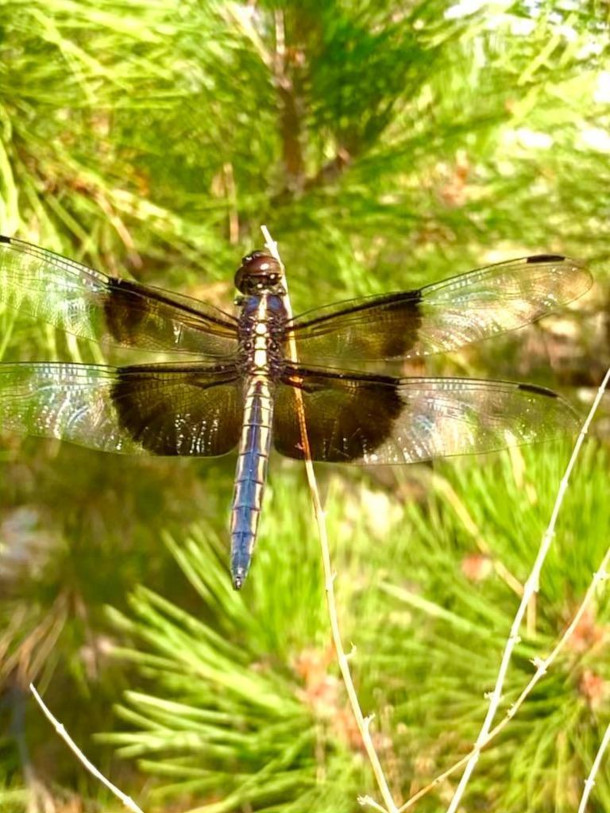
Male Widow Skimmer. Practicing “re-enchantment” involves actively noticing what draws your attention, author Brooke Williams says. (Photo: Brooke Williams)
WILLIAMS: It is a point of view shift. For instance, one of the major things that has happened to me is I've started to pay attention to the world and to things that happen as synchronicities, as opposed to coincidences, for instance. And you know, seeing a dragonfly or any sort of creature, a lot of people would say, well, that's just a coincidence. You happen to be in the same place at the same time, and you can look at it like that, but you can also look at it like something happened to your attention to where you notice this dragonfly because, or this other creature, whatever it is, because there's something you need to learn right now, or something that you need to pay attention to, and it's this idea of attention which is a positive thing. I mean, it's a real active phenomenon, as opposed to passive attention, which is what we're all suffering from now. I mean, we have these phones, and we just wait for these signals, whereas real attention is looking around and wonder what is trying to grab your attention. There's that writer, Arnold Mindell. He has this idea of flirting, which is not what we think it is, but flirting, from his perspective, is something flirts with you because you need it. It's demanding your attention for a purpose, where you can walk for a quarter mile with a group of kids and talk about what you saw, and no two kids saw the same thing, something different attracted each kid in a different way for some reason. I think it was Einstein, at least he gets credit for saying, I'm not sure he really did, that either everything is a miracle or nothing is a miracle. And if you get to choose, which are you going to choose? Why not pick everything as a miracle and start to like live as if that's the case?
DOERING: Why is marveling at the world and appreciating it something that our ancestors evolved to be able to do?
WILLIAMS: That's a good question. Our most distant ancestors, I feel like were living in bodies in a world that was all about survival of the fittest. And I feel like it was about, you know, paying attention, and it was about being one species among many. Everything that occurred within that day, within that moment, within those few feet around us, was potentially something that could feed us or kill us. And so we had to learn about everything. And I just feel like there's this amazing thing that happens with natural selection, for instance, where the things that we find most beautiful like flowers, like wildflowers, there's something that like taps into us with its beauty about a flower, and yet that flower is beautiful only as an unintended consequence of its ability to attract a pollinator so that it can pass its genetic material onto the next generation. And the fact that we find that beautiful and spectacular at times, to me, is like the miracle of life. Don't you think?
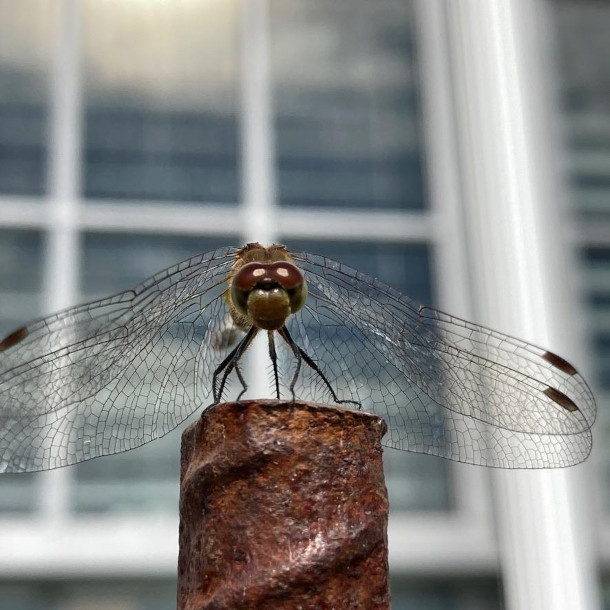
Female Autumn meadowhawk. Many cultures across space and time have considered the dragonfly a messenger between worlds. (Photo: Brooke Williams)
DOERING: Mm hm. So how do you think the dragonfly can be a gateway into learning how to practice re-enchantment? What can we learn from observing this creature?
WILLIAMS: Well, the simplest answer to that, I think, is that most cultures throughout the world think of dragonflies as the messenger between worlds. They spend most of their life as nymphs in ponds or in rivers at the bottom, and they molt where they grow so big they have to split open this casing, their carapace and break out of it into a bigger one. But at some point, something shifts, and instead of just molting from their casing, they crawl to the edge of the pond and up something vertical, and then they break open, like they always did, but this time, a dragonfly, an adult, breaks out, as opposed to another, a larger nymph. So there's this between worlds idea. So I really believe that one of the things that's really missing from our modern lives is this idea of the collective unconscious, which is the inner world. You know, this is a little weird, but what I do is, say they are messengers between the worlds. So many cultures believe that this is true, that there's got to be something to it, but it's something we can't prove, so we kind of ignore it as modern people, but say it is true. So when I see one, when my attention is attracted by a dragonfly, I do ask myself, is there something I'm not conscious of that I need to be right now?
WILLIAMS: To what extent do you think a cultural shift like re-enchantment could help us solve problems like the climate crisis?
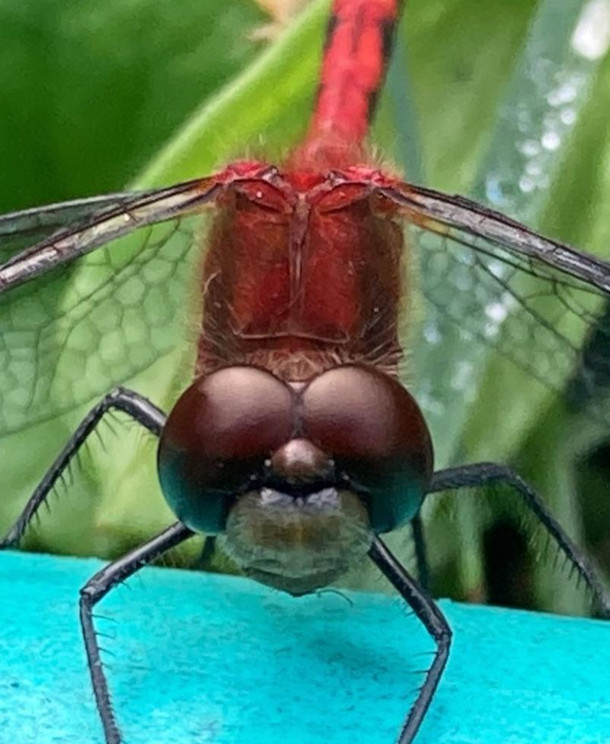
Male Autumn meadowhawk. Author Brooke Williams suggests that an “evolution of consciousness” may be the key to healing our relationship with the planet. (Photo: Brooke Williams)
WILLIAMS: I don't know how it will happen, but earlier, we were talking about the commodification of nature and that we've commodified almost every natural resource. And if you extrapolate, then we've commodified carbon. And if that commodification has its roots in disenchanting the world, then the fact that re-enchantment might help us solve this carbon problem. And so what does that really mean? I don't really even know what it means, but I feel like just talking about it. I've had the privilege of going around and talking about this book a number of different places, and I always bring up the fact that I'm not really here to sell the book, although that's the idea, but I really want to build this idea of re-enchantment, and I think that the, I don't believe the world was ever disenchanted really. I think our lives have been disenchanted, and if we can re-enchant our own lives, then I feel like it's, that we really tap into this collective nature of who we really are of one species among many. And each of us has like this burning part of our body that still has its evolutionary powers, and we're still animals really in these like modern bodies, carrying around these computers all day, but we still have this spark of evolution, and I feel like that's what we need to tap into. And it's not going to take everybody, but I just think the right number of people that start thinking in these ways, will figure out how the planet can make the best use of them. And I think that's what we need right now. I think again, Einstein was credited with saying you can't solve problems with the same consciousness that you created them with, or something like that. And you know, maybe evolution is so broad, it's not just like biological. It may be evolution of consciousness that we need, and whether that's the thing that will save us, who knows, but what do we got to lose, right?
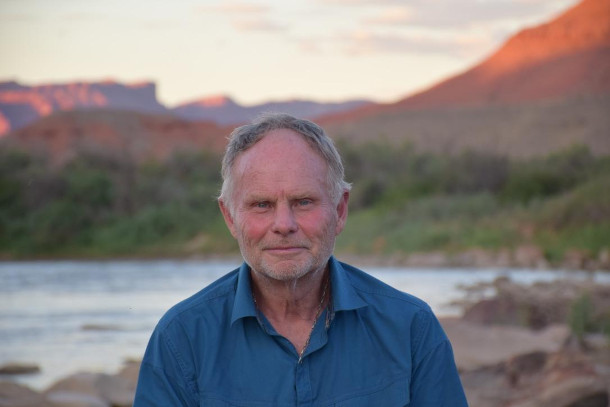
Brooke Williams is a Utah-based naturalist and the author of Encountering Dragonfly: Notes on the Practice of Re-enchantment. (Photo: Dan Schrag)
DOERING: Brooke Williams is the author of Encountering Dragonfly: Notes on the Practice of Re-enchantment. Thank you so much for joining us.
WILLIAMS: Thank you for having me, and thank you for all the great questions and the thought you put into this.
Links
Living on Earth wants to hear from you!
Living on Earth
62 Calef Highway, Suite 212
Lee, NH 03861
Telephone: 617-287-4121
E-mail: comments@loe.org
Newsletter [Click here]
Donate to Living on Earth!
Living on Earth is an independent media program and relies entirely on contributions from listeners and institutions supporting public service. Please donate now to preserve an independent environmental voice.
NewsletterLiving on Earth offers a weekly delivery of the show's rundown to your mailbox. Sign up for our newsletter today!
 Sailors For The Sea: Be the change you want to sea.
Sailors For The Sea: Be the change you want to sea.
 The Grantham Foundation for the Protection of the Environment: Committed to protecting and improving the health of the global environment.
The Grantham Foundation for the Protection of the Environment: Committed to protecting and improving the health of the global environment.
 Contribute to Living on Earth and receive, as our gift to you, an archival print of one of Mark Seth Lender's extraordinary wildlife photographs. Follow the link to see Mark's current collection of photographs.
Contribute to Living on Earth and receive, as our gift to you, an archival print of one of Mark Seth Lender's extraordinary wildlife photographs. Follow the link to see Mark's current collection of photographs.
 Buy a signed copy of Mark Seth Lender's book Smeagull the Seagull & support Living on Earth
Buy a signed copy of Mark Seth Lender's book Smeagull the Seagull & support Living on Earth

